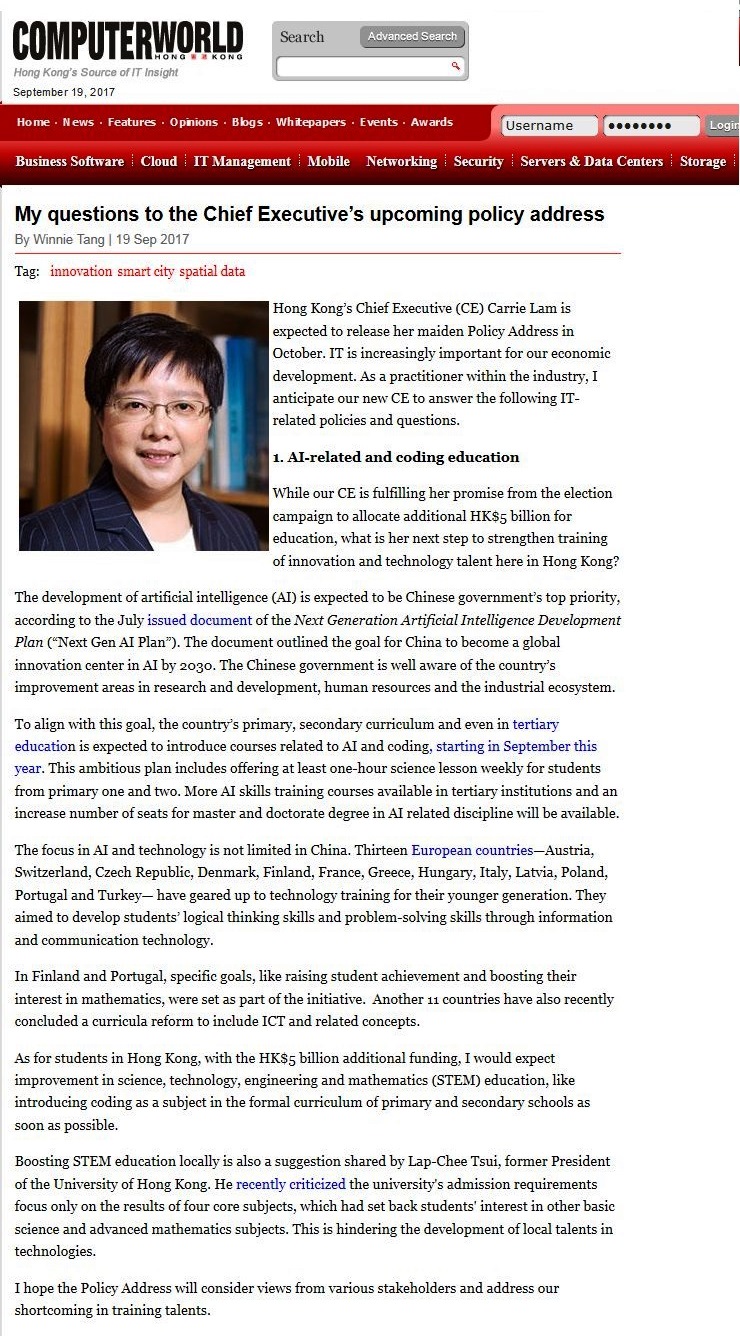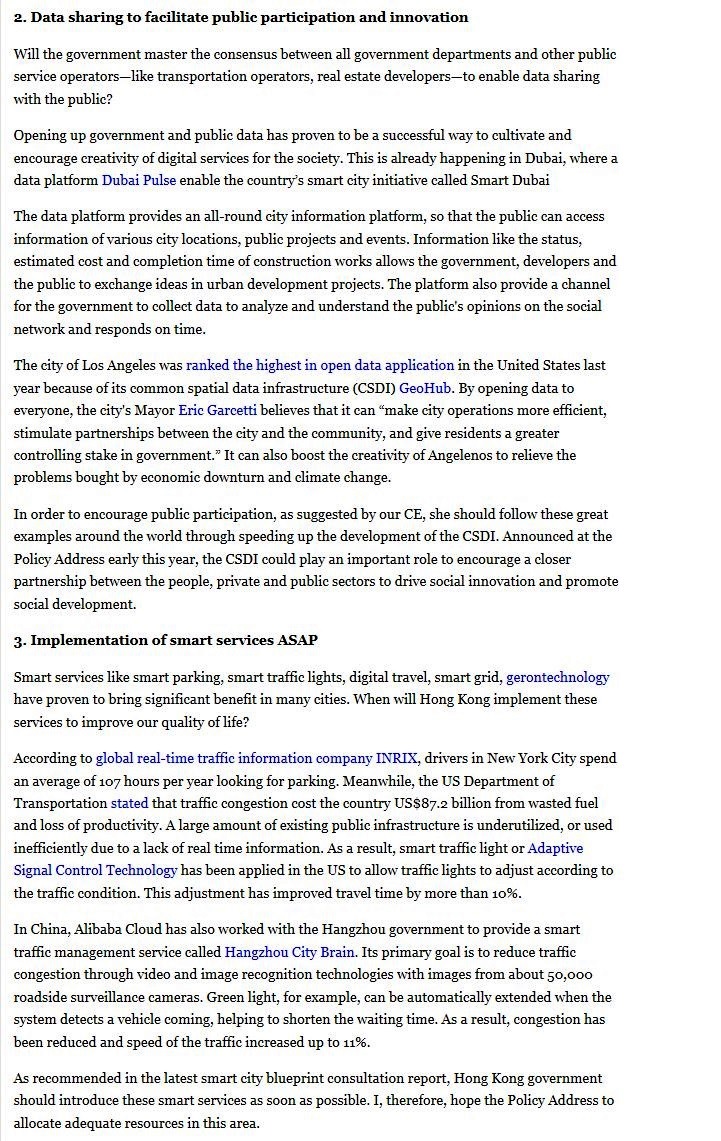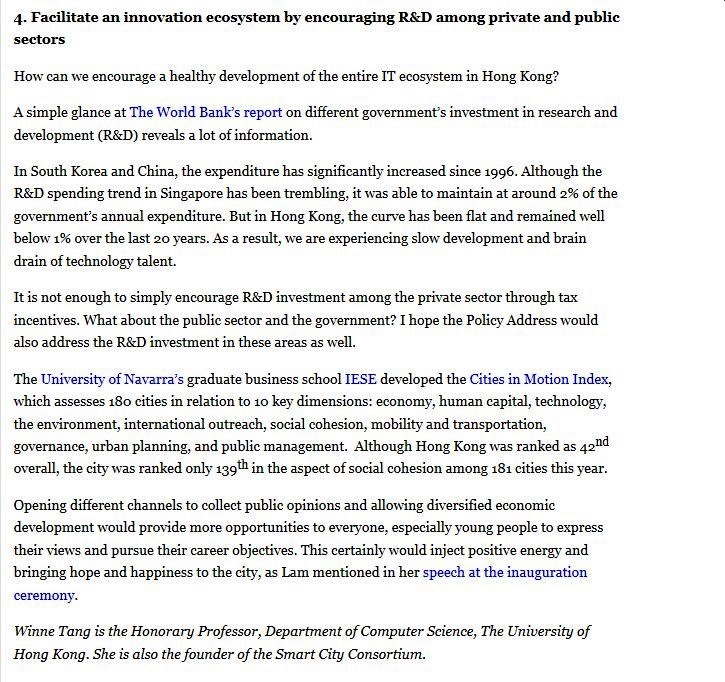網上版請按此



My questions to the Chief Executive's upcoming policy address
Hong Kong's Chief Executive (CE) Carrie Lam is expected to release her maiden Policy Address in October. IT is increasingly important for our economic development. As a practitioner within the industry, I anticipate our new CE to answer the following IT-related policies and questions.
1. AI-related and coding education
While our CE is fulfilling her promise from the election campaign to allocate additional HK$5 billion for education, what is her next step to strengthen training of innovation and technology talent here in Hong Kong?
The development of artificial intelligence (AI) is expected to be Chinese government's top priority, according to the July issued document of the Next Generation Artificial Intelligence Development Plan ("Next Gen AI Plan"). The document outlined the goal for China to become a global innovation center in AI by 2030. The Chinese government is well aware of the country's improvement areas in research and development, human resources and the industrial ecosystem.
To align with this goal, the country's primary, secondary curriculum and even in tertiary education is expected to introduce courses related to AI and coding, starting in September this year. This ambitious plan includes offering at least one-hour science lesson weekly for students from primary one and two. More AI skills training courses available in tertiary institutions and an increase number of seats for master and doctorate degree in AI related discipline will be available.
The focus in AI and technology is not limited in China. Thirteen European countries—Austria, Switzerland, Czech Republic, Denmark, Finland, France, Greece, Hungary, Italy, Latvia, Poland, Portugal and Turkey— have geared up to technology training for their younger generation. They aimed to develop students' logical thinking skills and problem-solving skills through information and communication technology.
In Finland and Portugal, specific goals, like raising student achievement and boosting their interest in mathematics, were set as part of the initiative. Another 11 countries have also recently concluded a curricula reform to include ICT and related concepts.
As for students in Hong Kong, with the HK$5 billion additional funding, I would expect improvement in science, technology, engineering and mathematics (STEM) education, like introducing coding as a subject in the formal curriculum of primary and secondary schools as soon as possible.
Boosting STEM education locally is also a suggestion shared by Lap-Chee Tsui, former President of the University of Hong Kong. He recently criticized the university'' admission requirements focus only on the results of four core subjects, which had set back students' interest in other basic science and advanced mathematics subjects. This is hindering the development of local talents in technologies.
I hope the Policy Address will consider views from various stakeholders and address our shortcoming in training talents.
2. Data sharing to facilitate public participation and innovation
Will the government master the consensus between all government departments and other public service operators—like transportation operators, real estate developers—to enable data sharing with the public?
Opening up government and public data has proven to be a successful way to cultivate and encourage creativity of digital services for the society. This is already happening in Dubai, where a data platform Dubai Pulse enable the country's smart city initiative called Smart Dubai.
The data platform provides an all-round city information platform, so that the public can access information of various city locations, public projects and events. Information like the status, estimated cost and completion time of construction works allows the government, developers and the public to exchange ideas in urban development projects. The platform also provide a channel for the government to collect data to analyze and understand the public's opinions on the social network and responds on time.
The city of Los Angeles was ranked the highest in open data application in the United States last year because of its common spatial data infrastructure (CSDI) GeoHub. By opening data to everyone, the city' Mayor Eric Garcetti believes that it can "make city operations more efficient, stimulate partnerships between the city and the community, and give residents a greater controlling stake in government." It can also boost the creativity of Angelenos to relieve the problems bought by economic downturn and climate change.
In order to encourage public participation, as suggested by our CE, she should follow these great examples around the world through speeding up the development of the CSDI. Announced at the Policy Address early this year, the CSDI could play an important role to encourage a closer partnership between the people, private and public sectors to drive social innovation and promote social development.
3. Implementation of smart services ASAP
Smart services like smart parking, smart traffic lights, digital travel, smart grid, gerontechnology have proven to bring significant benefit in many cities. When will Hong Kong implement these services to improve our quality of life?
According to global real-time traffic information company INRIX, drivers in New York City spend an average of 107 hours per year looking for parking. Meanwhile, the US Department of Transportation stated that traffic congestion cost the country US$87.2 billion from wasted fuel and loss of productivity. A large amount of existing public infrastructure is underutilized, or used inefficiently due to a lack of real time information. As a result, smart traffic light or Adaptive Signal Control Technology has been applied in the US to allow traffic lights to adjust according to the traffic condition. This adjustment has improved travel time by more than 10%.
In China, Alibaba Cloud has also worked with the Hangzhou government to provide a smart traffic management service called Hangzhou City Brain. Its primary goal is to reduce traffic congestion through video and image recognition technologies with images from about 50,000 roadside surveillance cameras. Green light, for example, can be automatically extended when the system detects a vehicle coming, helping to shorten the waiting time. As a result, congestion has been reduced and speed of the traffic increased up to 11%.
As recommended in the latest smart city blueprint consultation report, Hong Kong government should introduce these smart services as soon as possible. I, therefore, hope the Policy Address to allocate adequate resources in this area.
4. Facilitate an innovation ecosystem by encouraging R&D among private and public sectors
How can we encourage a healthy development of the entire IT ecosystem in Hong Kong?
A simple glance at The World Bank's report on different government's investment in research and development (R&D) reveals a lot of information.
In South Korea and China, the expenditure has significantly increased since 1996. Although the R&D spending trend in Singapore has been trembling, it was able to maintain at around 2% of the government's annual expenditure. But in Hong Kong, the curve has been flat and remained well below 1% over the last 20 years. As a result, we are experiencing slow development and brain drain of technology talent.
It is not enough to simply encourage R&D investment among the private sector through tax incentives. What about the public sector and the government? I hope the Policy Address would also address the R&D investment in these areas as well.
The University of Navarra's graduate business school IESE developed the Cities in Motion Index, which assesses 180 cities in relation to 10 key dimensions: economy, human capital, technology, the environment, international outreach, social cohesion, mobility and transportation, governance, urban planning, and public management. Although Hong Kong was ranked as 42nd overall, the city was ranked only 139th in the aspect of social cohesion among 181 cities this year.
Opening different channels to collect public opinions and allowing diversified economic development would provide more opportunities to everyone, especially young people to express their views and pursue their career objectives. This certainly would inject positive energy and bringing hope and happiness to the city, as Lam mentioned in her speech at the inauguration ceremony.
Dr. Winnie Tang
Honorary Professor, Department of Computer Science, The University of Hong Kong